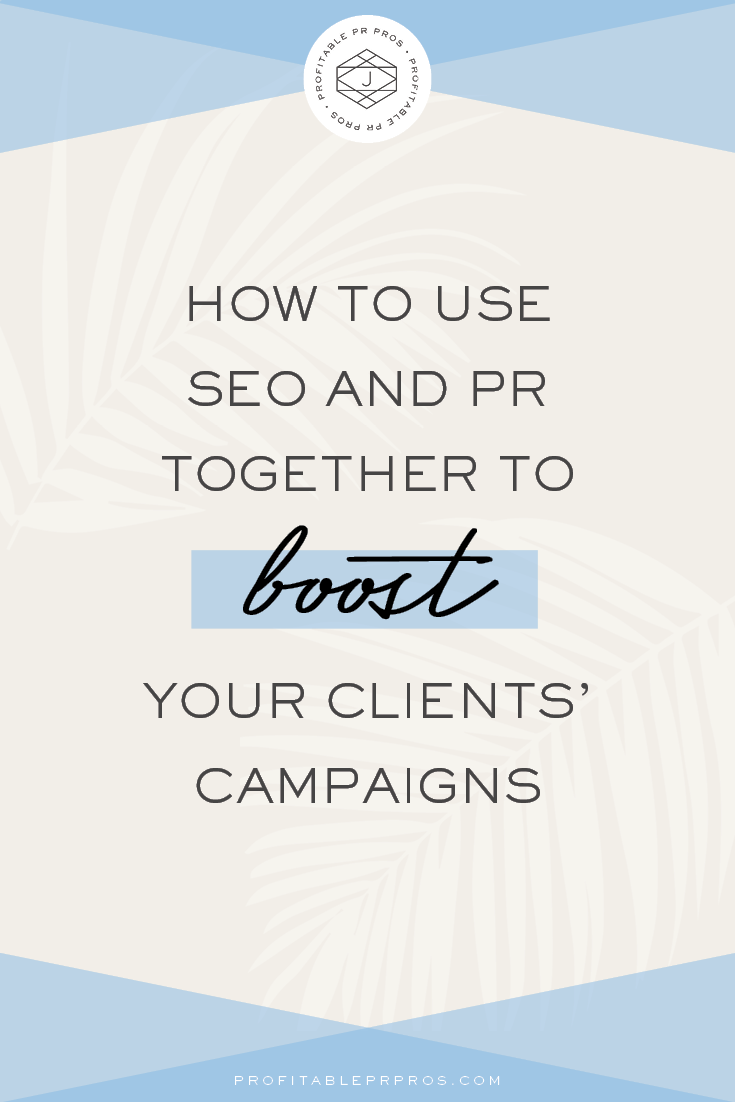How to Use SEO and PR Together to Boost Your Clients' Campaigns
Sep 06, 2022
SEO, or search engine optimization, isn’t anything new. Honestly, it feels like a constant topic of conversation in the digital marketing world! But SEO’s power isn’t limited to just marketing — you can use SEO and PR together to support your strategy and generate better results for your clients.
What Is SEO?
SEO is a super powerful strategy where you optimize your website to rank higher and land at the top of the search results for certain terms. To do this, digital marketers will use targeted keywords relevant to their client’s products or services in all of their marketing content. The goal is to get more clicks and more traffic to their client’s website.
I know this doesn’t seem too relevant to PR, but hear me out! While you might not use SEO in the traditional way, you can still use it to support your PR efforts. As a PR pro, you’re responsible for creating content for a brand, whether through digital campaigns, pitches, or celebrity and influencer placements. That content is going to appear in search results anyway, so why not try to boost your ranking and get your client on Google’s front pages?
How Are SEO and PR Links Different?
Links are hugely important in SEO, and PR includes some strategic linking, too. But the way an SEO marketer incorporates links is super different from how a PR pro would!
PR links can come from anywhere, really, as long as the link is tied to an opportunity for brand exposure. All types of media are fair game for linking, and the text will usually link to other branded content. PR pros will link text that will inspire clicks — think a brand or product name, a relevant trend, or a celeb’s name.
SEO linking, on the other hand, is all about authority. You want to strategically link to show search engines that your client’s site is credible and should rank higher for the chosen keywords. What to link and where to link are important here: the link text and content surrounding the link should reinforce your client’s authority in their niche.
Why Should PR Pros Use SEO?
So you’ve got a grasp on what SEO is…but why should you go through the trouble of adding it into your regular retainer services? Well, the possibilities are endless when you combine SEO and PR! Using them together helps you boost your client’s brand visibility in as many places as possible online.
Plus, adding SEO services can give you a competitive edge within your niche. Knowing the best strategies to boost brand awareness through search will put your clients at an advantage and help them reach their PR goals. Who doesn’t want to work with a PR pro with that knowledge?!
Related: Which PR Services Should Be Included in Your Retainer?
5 Ways SEO and PR Go Hand-In-Hand
Ready to give your clients a boost with some smart SEO strategies? Here are five ways SEO and PR can be utilized together to support your PR efforts.
Load Your Client’s Site with Priority Keywords
SEO is all about the keywords. Work with your client to identify some priority keywords that are relevant to their brand, products, or services. You can use keyword research tools to find words or phrases with a high search volume and low search difficulty — these will be your best bet for a high rank.
Homepage, about page, product pages, original content (like blog posts)…everything needs to have keywords! But be sure to not over-optimize your client’s site. Overusing keywords and unnaturally inserting them into copy can raise a red flag for search engines and get the site marked as spam.
Utilize Keywords In Your PR Materials
Next up on the keyword checklist is your PR materials. When using SEO and PR together, you can incorporate some of your client’s priority keywords into things like pitches, press releases, or digital campaign materials. Earned media coverage will appear in search results, especially when you score a feature in a top-tier outlet.
Using keywords in your pitches has the added benefit of helping an editor or journalist easily find your pitch in their crowded inbox. If you’re focusing on a certain product, include more specific, targeted keywords that highlight some of the product’s details.
Request Backlinks In Your Pitches
Backlinks are a major part of strategic SEO linking. They’re links from another source that link back to your client's website. You can ask journalists to include backlinks to your client’s site or product in their article when you pitch to them.
The more backlinks your client’s site gets, the more trustworthy it will seem to search engines. But they’ll get a major ranking boost when an established media outlet links to them! It’s super important that you secure those backlinks from high-quality digital publications when you land placements.
Incorporate Keywords Into Social Posts
Posts from Instagram, Facebook, Twitter, and even TikTok and YouTube can appear in search results…so get keywords in your captions! You could focus on your client’s priority keywords or include only keywords relevant to the post’s content.
Just make sure the keywords are incorporated naturally into each post. Ranking is great, but a visibility boost doesn’t matter much when the social copy is robotic and not aligned with a brand’s voice.
Optimize for Mobile
The highest-ranking sites are all optimized for mobile, meaning they’re easy to navigate on your phone and have the same user experience as on a computer. But optimizing your client’s site for mobile should not be part of your retainer, even if you’re offering SEO and PR services.
Encourage your client to hire a web developer (they could even outsource this to a contractor) to execute the web fix. Make sure you point out this crucial SEO step early on in your partnership. You don’t want to lose out on press features because an editor couldn’t navigate your client’s site on their phone!
5 Things You Need to Avoid When Using SEO and PR Links
You’ve got your keyword strategies down, but what about linking? Incorporating links correctly is one of the trickiest parts of using SEO and PR, as links function differently in each. Read on to learn what you should avoid when utilizing SEO and PR links.
Never Pay for Editorial Links
You’re a PR pro — you know not to pay for your editorial links! But this is important for SEO, too. Paid links (whether you pay money or send products in exchange for a linked review) can be considered manipulative or spammy by search engines since you’re not organically earning traffic. Your client’s site will be penalized in search as these paid links pile up.
But this doesn’t mean you can’t buy sponsored posts or advertorials! Those are okay as long as they have a “rel=nofollow” tag on the URL; this tag lets search engines know that the link has been paid for and shouldn’t rank in any results. When you purchase content, double-check to make sure the link is formatted properly to avoid a penalty.
Related: WTF is Up With Paid Media Placements?
Watch Out for Unnatural Linking
Incorporating keywords naturally is an important part of combining SEO and PR, but so is incorporating links naturally. Linking keywords or phrases (known as “rich anchor text”) can set off alarm bells for search engines.
It’s best to link text like website or organization names, especially when they make more sense than linking a keyword. That way, you’ll avoid any search engine penalties and keep your clients on the path toward a high rank.
Don’t Include Irrelevant Links
Establishing search credibility with backlinks works in two ways: other people linking to your site and you linking to other sites. When you link out to other sites in your client’s content, you need to make sure those links are relevant! Targeted, relevant links are crucial to your dual SEO and PR strategy.
The links should make sense for your client’s niche and target audience. You want these links to be valuable to whoever clicks them — the more valuable the links, the more credible your client’s site will be to search engines and potential customers.
Remember that PR Isn’t Meant for Link-Building
Don’t lose focus of your original PR goals when combining SEO and PR in your strategy. You’re a PR pro, after all! If you wanted to focus on just SEO, you wouldn’t have chosen this path.
Link-building may be at the heart of SEO, but that’s just not what PR is about. Your client trusted you with their brand because they believe in your talent and your ability to build awareness through earned media and killer campaigns. As you continue to utilize SEO in your PR strategy, link-building will happen naturally. High-quality backlinks are for sure valuable, but they’re not a measure of your success.
Limit Your Links
Just like you shouldn’t go overboard with keywords, don’t go overboard with links. Limit your links to just a few spots in a blog post, webpage, social post, or pitch. All of your links should be targeted and effective (and lead to high-quality sites).
Focus on when a link makes sense for the reader. Is this something they want to click on and read further? Does this linked site provide value for them? If the answer to either question is no, leave out the link.
SEO is a lot to wrap your head around as a PR pro. But understanding this digital marketing strategy is the key to giving your client’s online presence a boost through high search rankings. When you combine SEO and PR in your strategy, you’ll set your clients on a path toward better brand visibility.









